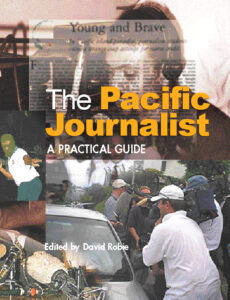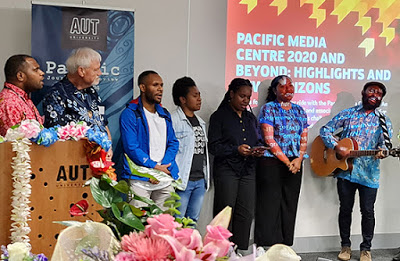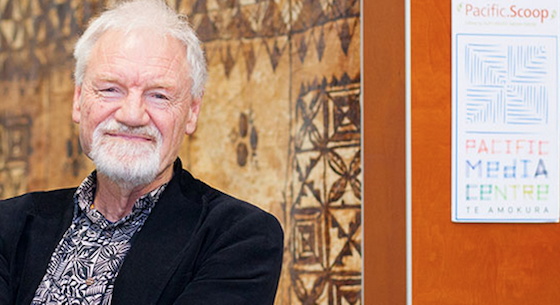Report by Dr David Robie – Café Pacific. –
By Laurens Ikinia
A JOURNALIST who sailed on board the bombed environmental ship Rainbow Warrior, was arrested at gunpoint in New Caledonia while investigating French military garrisons in pro-independence Kanak villages, and reported on social justice issues across the Pacific has stepped down as founding director of the Pacific Media Centre.
Professor David Robie, 75, an author, academic, independent journalist and journalism professor at Auckland University of Technology, retired last week after more than 18 years at the institution.
He has been working as a journalist for more than 56 years and as an academic for more than 27 years.
- READ MORE: Pacific journalism, media and diversity researchers tackle challenges ahead
- Gallery: PMC celebrates Pacific ‘reset’ vision and farewells founding director
As well as playing a role in critical moments of history as a journalist in the region, his students have also covered landmark events that helped shape some Pacific nations, especially in Melanesia – such as the 1997 Sandline mercenary crisis in Papua New Guinea and the George Speight coup in Fiji in May 2000.
But a journalism or academic career were not always clearcut pathways for Dr Robie. During his studies in high school, he was heavily involved in outdoor pursuits and he became a Queen’s Scout.
At the time he was thinking of becoming a professional forester and he was recruited by the NZ Forest Service at 17 in 1963 as a forester cadet with a view to studying for a BSc and then forestry science.
But the same year he was selected to represent New Zealand at a World Jamboree at Marathon Bay, Greece – the site of a famous battle between the Athenians and the Persians in 490 BC.
Future options
This brought his future options to a head.
“At school I was interested in three things – writing, art and mapping/outdoors. So, that’s why I initially wanted to become a forester,” he says.
But going to Greece changed everything. He started his science degree course while working part time at the NZ Forest Service publications division at its headquarters in Wellington. He then realised he was more interested in writing.
“I realised that I didn’t want to spend my life talking with trees, even though I love trees, he says.”
At the end of the year, he became a cadet journalist at The Dominion (now the Dominion Post). Shortly after he became the youngest subeditor at the newspaper.
He later went to Auckland to work as assistant editor on Auto Age magazine, had a short stint on The New Zealand Herald as a subeditor before moving to Australia to join the Melbourne Herald.
While working there in 1968, he was strongly influenced by the student riots in Paris and took a serious interest in politics over the student protests against Australia’s involvement in the Vietnam War.
Youngest editor
At 24, he became the youngest editor of a national Sunday newspaper, the Sunday Observer, which campaigned strongly against the Vietnam War.
In his mid-20s, Dr Robie migrated to Johannesburg, South Africa, and was appointed chief subeditor of the Rand Daily Mail, the country’s leading newspaper crusading against the apartheid regime.
Even though Dr Robie’s social justice views as a journalist became shaped while he was working at the Sunday Observer in Melbourne, this was not risky as in South Africa.
“In South Africa, we were really pushed hard. I probably learned most of what I have learned in my career as a journalist in South Africa.
“Mainly because of the threats and experiences. I worked with a number of ‘banned’ and inspirational people, like photojournalist Peter Magubane.
“I was threatened many times and on one occasion I drove Winnie Mandela’s two daughters from their home in Soweto to a multiracial school in Swaziland because Winnie, being banned, could not travel.
“I drove the girls 360 km through roadblocks to take the children to school,” Dr Robie recalls.
Threats against journalists
The late Winnie Mandela was the wife of imprisoned anti-apartheid revolutionary Nelson Mandela who became President of South Africa 1994-1999 and died in 2013. The two daughters are Zindziswa Mandela and Zenani Mandela-Diamini.
While working in South Africa, Dr Robie learned a lot of things he had never experienced in New Zealand – the vital need to campaign for social justice, threats against journalists and jailings, and the role of human rights journalism.
Subsequently, he travelled overland as a freelancer across Africa and ended up in Nairobi, Kenya. There, he worked as group features editor of the Aga Khan’s Daily Nation for a year before travelling to West Africa, Nigeria and across the Sahara Desert to Algeria and France.
In Paris, he camped in the Bois de Boulogne forest until he found a garret to live in a refurbished 17th century building in Rue St Sauveur in the heart of the city.
He worked for Agence France-Presse global news agency for three years and covered the 1976 Montreal Olympic Games when there was a black African walkout in protest about New Zealand playing rugby against white South Africa.
While working for AFP, he gained familiarity with French foreign colonial policies, and especially the nuclear testing issue in the South Pacific.
 |
| The Pacific Journalist 2001 … one of David Robie’s books on South Pacific media and politics. Image: USP |
He says it was ironic that it took travelling to France for him to “wake up” to the Pacific right on New Zealand’s doorstep.
Foreign editor
Dr Robie returned to New Zealand in 1979 and became foreign editor on the Auckland Star. He started doing trips to the Cook Islands, New Caledonia, Tahiti, Vanuatu and elsewhere as a freelance in his holidays. He thought he might as well go fulltime freelance to do the stories he was interested in.
In 1984, he set up the Asia Pacific Network which he ran for 10 years from his home in Grey Lynn.
He became a chief correspondent for Fiji-based Islands Business news magazine covering investigative and environmental stories and decolonisation issues. He also reported for the Global South news agency Gemini, The Australian, the New Zealand Times, RNZ International and other media.
In 1985, he sailed on board the Greenpeace flagship Rainbow Warrior for 11 weeks and took part in the evacuation of islanders from Rongelap Atoll.
French secret agents bombed the Rainbow Warrior on 10 July 1985 and he wrote the book Eyes of Fire: The Last Voyage of the Rainbow Warrior – the first of 10 books.
In early 1987, he was arrested at gunpoint near Canala, New Caledonia, for taking photographs of “nomadisation” style military camps designed to intimidate Kanak villagers seeking independence.
In 1993, Dr Robie was appointed as a lecturer and head of journalism at the University of Papua New Guinea. His students published the award-winning fortnightly newspaper Uni Tavur and they covered the 1997 Sandline crisis when the military commander arrested foreign mercenaries hired by the PNG government to wage war against rebels on Bougainville in a “coup that wasn’t a coup”.
PJR launched
While at UPNG, Dr Robie launched Pacific Journalism Review, the only specialised research journal to investigate media issues in the South Pacific, Asia-Pacific, Australia, and New Zealand.
As a journalist and journalism educator, he raises concern that “most media organisations send someone to cover a particular event – they go in and they come out. Quickly. It is parachute journalism. Unfortunately, it is not a good way to cover things.
“Often journalists who work on a parachute basis don’t have enough background. They don’t have enough information or the sources to get a deeper understanding of the complex nuances,” he says.
After serving Papua New Guinea as a journalism educator for more than five years, he shifted to the University of South Pacific in Fiji.
In 1998, Dr Robie began his new journey as head of USP’s journalism department. He was teaching while actively writing news articles, academic journal articles, and books.
“One of the lessons I learned as a journalism educator is that a journalism project is the best way to learn,” he says.
He cites the George Speight coup in Fiji in May 2000 when his students covered downtown riots in Suva, the seizure of the elected government in Parliament at gunpoint by Speight’s renegade soldiers, and a protracted siege as an example.
The PMC Project – A short documentary by Alistar Kata. Video: PMC
Crisis website updates
The students updated their website Pacific Journalism Online several times daily at a time when the mainstream newspapers did not have websites and they produced the Wansolwara newspaper that the university tried to confiscate.
“What we were doing was contributing to empowerment. To me, empowerment is really important. It isn’t just about writing a good story, and things like that. But empowering, giving people the information that they need to make decisions in a democracy,” he says.
Dr Robie also gained his PhD in history/politics from the University of the South Pacific. After serving the country for five years, he moved back to New Zealand.
Since 2002, Dr Robie has worked at AUT and became director of the Pacific Media Centre in 2007 and remained editor of Pacific Journalism Review.
 |
| West Papuan students sing Tanah Papua in honour of PMC director Professor David Robie earlier this month. Image: PMC |
He became an associate professor in 2005 and a professor in 2012. During his academic career, Professor Robie gained a number of awards nationally and internationally, including the 2015 AMIC Asia Communication Award in Dubai, Vice-Chancellor’s Teaching Excellence Award in 2011, the PIMA Special Award for Contribution to Pacific journalism in 2011 and the PIMA Pacific Media Freedom award in 2005.
Dr Robie was also an Australian Press Council fellow in 1999, and has been on the editorial boards of Asia-Pacific Media Educator, Australian Journalism Review, Fijian Studies, Global Media Journal and Pacific Ecologist.
He is currently the New Zealand representative of the Asian Media, Information and Communication Centre (AMIC) and a life member. His books are listed at NZ Pen.
One thing can be sure. Social justice will remain high on his ongoing agenda.
Laurens Ikinia is a Papuan Masters in Communication Studies student at Auckland University of Technology who has been studying journalism. He is on an internship with AUT’s Pacific Media Centre. This article was first published by Asia Pacific Report.
This article was first published on Café Pacific.





